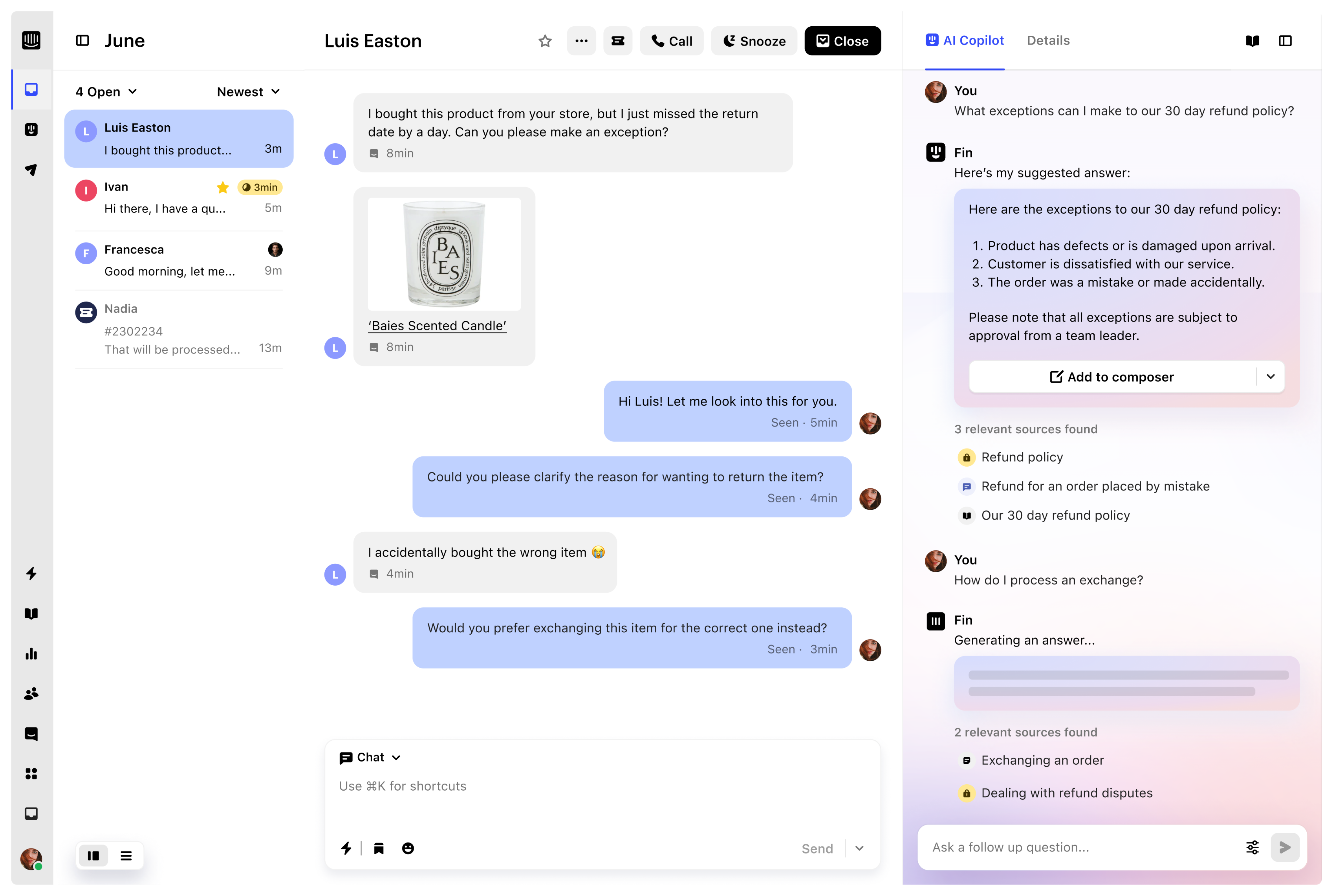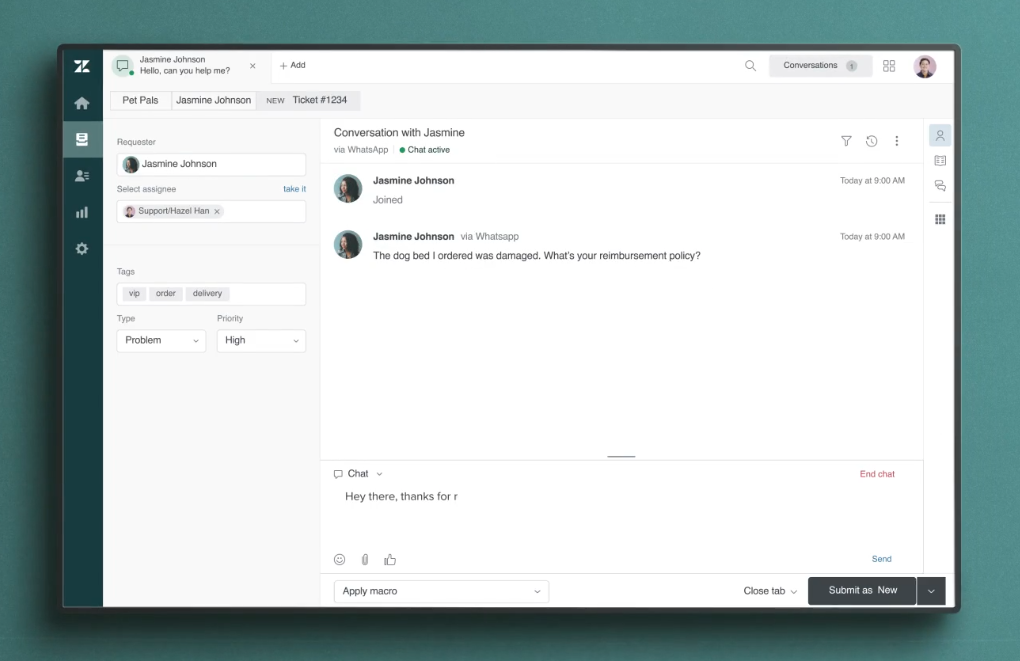| Features | Intercom | Zendesk |
|---|---|---|
| CRM | No, integrations only | Yes, add-on |
| Ticketing system | Yes | Yes |
| AI agents | Yes, usage-based pricing | Yes |
| Automation | Yes | Yes |
| Help desk | Yes | Yes |
| Omnichannel | Yes, limited | Yes |
| Analytics | Yes | Yes |
| Knowledge base | Yes | Yes |
| Workflow automation | Yes | Yes |
| Quality assurance | No | Yes, add-on |
| Pricing | $29–$132 per agent per month, plus extra fees for AI, email, SMS, WhatsApp, and phone interactions | $19–$115 per agent per month, or custom pricing for Enterprise plans |
We don’t need to tell you that quality customer service counts. But to provide this service, you need to support your team with the right tools. And with so many options currently on the market, this can be easier said than done.
So we’ve simplified things. By comparing two of the industry’s most popular platforms, Intercom vs Zendesk, you can decide which features mean the most to you and narrow down your selection process — helping you feel more confident in your choice.
Pro Tip
Enhance your customer service with Jotform AI Agents by integrating seamless, real-time assistance across multiple channels, automating repetitive tasks, and personalizing user interactions to deliver faster support.
What is Intercom?
Intercom is a customer service platform built with an emphasis on AI tools. Through features like its AI agent, Fin, Intercom offers customers a human-like service experience combined with the convenience of a chatbot.
For agents, Intercom is equipped with a variety of AI-powered tools built to increase productivity and overall effectiveness. Beyond its next-generation solutions, Intercom also comes equipped with all the essential tools you’d expect for a customer service team — like shared inboxes, basic chatbots, ticketing systems, and more.
What is Zendesk?
Zendesk is a popular cloud-based platform aimed at enhancing the customer service experience. It’s primarily focused on improving communication with customers while streamlining the agent experience to deliver more efficient and seamless service — backed by a wide range of tools like AI chatbots, access logs, data encryption software, and more.
Target audiences of Intercom vs Zendesk
While both Intercom and Zendesk offer customer service solutions, their value proposition and selling approach vary slightly.
Intercom
Intercom typically targets customer support teams seeking to improve customer communication and self-service — freeing up agents to do more meaningful work. However, their tools can also be used by any business looking to streamline workflows, with core offerings tailored toward support agents and leaders alike.
Zendesk
Zendesk has been widely adopted across industries, from the financial sector to retail, targeting businesses looking to scale their customer service operations and elevate service quality. While it does offer side products for sales and HR teams, its primary selling point is as a customer service platform.
Key features of Intercom vs Zendesk
Both Intercom and Zendesk offer core features that can benefit your customer service team.
| Intercom | Zendesk |
|---|---|
| Fin AI Agent: Resolves common issues using a human-quality AI agent system, saving your agents valuable time. | AI-driven automation: Optimizes customer service workflows through tools such as Content Cues, Answer Bot, and auto-generated ticket summaries. |
| Fin AI Copilot: Acts as a personal assistant and extension of the Fin AI system. This solution lives in your agents’ inbox, facilitating effective customer conversations through guidance, troubleshooting, training, and analytics. | Sophisticated ticketing system: Streamlines ticket management with a combination of AI, automation, and intelligent routing. This system can customize your process and centralize ticketing data depending on your needs. |
| Help center: Acts as a self-service, public knowledge base, making your customers’ and agents’ lives easier. | Knowledge management: Empowers customers and agents alike with an advanced knowledge management system featuring flexible hierarchies, multiple levels of categorization, and multi-language capabilities. |
| Omnichannel communication: Creates a consistent experience across your customer communication chann els, including email, live chat, social media, phone, and WhatsApp. | Omnichannel support: Enables a seamless customer experience across multiple channels, including email, social media, SMS, web and app messaging, voice, and Apple Messages for Business. |
| Proactive support tools: Allow your team to get ahead of onsite and in-app support issues with features like chat, banner messages, and tooltips to provide on-the-spot assistance. | Comprehensive analytics: Allow agents to view and customize data, reports, and dashboards in a way that works best. |
Common features of Intercom and Zendesk
Although these solutions offer their own distinct advantages, they also share many common features:
- AI and automation: Both Zendesk and Intercom place a heavy emphasis on their AI capabilities. Each solution offers its own AI agent tool, along with AI customer service tools and advanced automations.
- Ticketing system: Both solutions offer advanced ticket systems built on centralizing your agents’ access to customer data, featuring automations and performance optimization abilities.
- Omnichannel capabilities: While Intercom and Zendesk may have different approaches and ranges to omnichannel communication, both offer multichannel access across live chat, messaging, and email.
- Data customization: Both solutions allow you to customize how you view and organize customer data, featuring dashboards and report builders to help accurately track performance.
- Shared inbox: Both Zendesk and Intercom centralize customer interactions into a single, unified inbox, allowing your agents to monitor every channel without having to flip between tools.
Pro Tip
Looking to make customer email support faster and more consistent? Use Jotform’s Gmail Agent to automatically draft replies that reflect your team’s tone, policies, and past messages — helping you scale support while maintaining a personal touch for your customers.
Unique features of Intercom vs Zendesk
While Intercom and Zendesk are similar in their overall functionality, there are a few key distinctions that set them apart.
| Intercom | Zendesk |
|---|---|
| Proactive support: Offers in-context support for customers who may be struggling with an issue. This feature allows customers to resolve the issue on their own — improving the overall customer experience. It is available in all plans but can be upgraded with an optional add-on. | Quality assurance (QA) tools: Offers advanced QA tools such as voice QA, QA for AI agents, and more for an additional monthly cost per agent. This can take your performance strategy to the next level. |
| Usage-based communication: Lets you choose what you spend on certain communication channels, including outbound email, voice, SMS, and WhatsApp. While these costs can add up if you rely on these channels, it allows you to save on features you may not use — or reduce your per-send cost at high volumes. | CRM capabilities: Offers CRM capabilities through Zendesk Sunshine. This add-on allows you to further personalize, adapt, and enhance your customer experience by integrating advanced tools throughout your system. |
Comparing Intercom vs Zendesk side by side
When making a final decision about Intercom vs Zendesk, it can help to compare their features and capabilities side by side.
| Features | Intercom | Zendesk |
|---|---|---|
| CRM | Can connect with CRMs through integrations. | Add-on CRM capabilities with Zendesk Sunshine. |
| Ticket management | Offers advanced management for customer, back office, and tracker tickets for a seamless experience. | Offers a centralized ticketing system built on automation, smart routing, and reporting to optimize agent performance. |
| AI and automation | Features Fin AI Agent, Fin AI Copilot, AI insights and reporting, and a variety of other automations. | Features AI agents, AI agent tools, workflow automation, and smart ticketing. |
| Omnichannel communication methods | Most plans have unlimited use of live chat, inbound email, and social. There are usage-based charges for outbound email campaigns, SMS, WhatsApp, and phone. | Provides access to email, messaging and live chat, social media and business channels, and voice in all plans except the lowest tier. |
| Integration options | More than 300 integrations and apps available in the App Store. | More than 1,700 pre-built apps and integrations. |
Comparing pricing and plans for Intercom vs Zendesk
Both of these solutions offer several packages you can choose from based on your requirements and budget — however, there are a number of add-ons and additional costs worth considering as well. Keep in mind that the prices listed for these core plans are what you’ll pay if you’re billed annually and are charged per agent per month.
Intercom
- Essential: For $29, this includes features such as a shared inbox, basic chatbots, ticketing system, public help center, proactive support, live chat, inbound email, and analytics.
- Advanced: Starting from $85, this plan gives you access to all features in the Essential subscription, plus advanced custom reports, social channels, workflow automation, and multiple team inboxes.
- Expert: For $132, you can access all features in the Advanced plan, plus workload management, multiple help centers, SSO and identity management, and custom roles.
However, certain communication methods and AI features come at an additional cost:
- Email campaigns: Available from $0.00025 to $0.045 per email sent, based on volume.
- SMS: From $0.01 to $0.09 per SMS sent or received, based on volume and region.
- WhatsApp: From $0.03 to $0.10 per conversation, based on volume or bulk options.
- Phone: Starts at $0.012 per minute (functionality is also limited based on core plan).
- Fin AI Agents: $0.99 per successful customer resolution.
- Fin AI Copilot: Free to use for 10 tickets or conversations per agent per month, but costs an additional $29 per agent per month for unlimited access.
Zendesk
Suite Enterprise: Enterprise pricing varies according to needs, which requires meeting with Zendesk’s sales team. But depending on your budget, you can add advanced features like a sandbox, approval workflows, audit logs, AI-powered Content Cues, customer agent roles, and more.
Support Team: At $19 per agent per month, this beginner plan offers access to key features such as the ticketing system, Unified Agent Workspace, customer details, conversation history, analytics dashboards, and more.
Suite Team: At $55 per agent per month, this plan introduces AI, automation, and omnichannel service into your toolbelt with features like AI agents, customer and internal knowledge bases, social media messaging, and text messaging.
Suite Professional: For $115 per agent per month you can access optimization tools like custom analytics, skills-based routing, service-level agreements, self-service portals, and more.
Jotform — a smart alternative
While both Intercom and Zendesk offer powerful capabilities, you should consider an alternative that can provide similar benefits without the additional cost.
Jotform is an all-in-one customer service management solution that allows you to easily communicate with, and collect feedback from, your target audience. But that’s not all — this industry-leading tool features a range of unique capabilities:
- Choose from over 700 pre-made feedback forms to gauge consumer sentiment and product success
- Build metric-specific forms through dedicated features like the Net Promoter Score survey builder
- Allow customers to view and respond to forms on any device, enabling them to interact with your brand at their convenience
- Use conditional logic to automatically trigger actions based on what a customer chooses, reducing the need for manual monitoring and engagement
- Set up custom notifications for key interactions, such as complaints or service requests, so essential data never goes unnoticed
- Store customer data in easy-to-use spreadsheets with Jotform Tables, and transform it into actionable insights through the Jotform Report Builder, allowing you to monitor resolution times and identify common problem areas
Already settled on Intercom or Zendesk as your primary customer service solution? Don’t worry — Jotform can integrate with both, making these already powerful platforms even more effective.
Supercharge your customer service with Jotform
Choosing a customer service solution is a serious decision — the wrong one could send your customers into the arms of a competitor, while the right one should empower your team to provide the best service possible.
Pro Tip
Elevate your customer service experience with an AI phone answering system to provide 24/7 support and quick assistance.
So whether you choose Jotform as an outright tool, or decide to integrate it with Intercom or Zendesk, you can count on its industry-leading capabilities to turn forms into tickets, collect customer requests and orders, and manage data seamlessly. The best part? You can get started for free today, and watch your customer service team soar.
Photo by Zen Chung





































Send Comment: